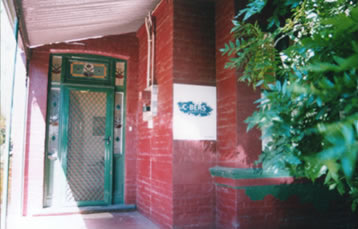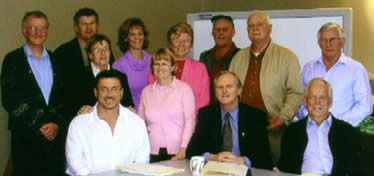The end of an era - And a change in direction
After a decade in operation, CBERS Services in Subiaco closed its doors for the last time on the 23rd December 2005. During those ten years more than 500 people approached CBERSS, seeking help in a number of areas: family tracing, literacy classes, no-interest loans, supportive counselling, and funded travel for family reunification. A dwindling demand for client services prompted CBERSS to look for a more effective model of service to meet the on-going needs of former child migrants and Australian born ex-residents and students of Christian Brothers' institutions.
 The Alvan Street years
The Alvan Street years
Many people will remember this image of CBERS Services - the front door of 12 Alvan Street Subiaco, which was CBERSS home base from 1997 to December 2005. The house in Alvan Street was where most of CBERSS' work was carried out, and it provided a welcoming and friendly point of contact for many clients during some very difficult times. It was at Alvan Street that CBERSS met the groundswell of people who came forward when they realized it was safe to talk about their childhood trauma and abuse; that they would be believed; and that they would be offered help.
CBERSS was established in 1995 in response to the recommendations of the ISERV panel (Independent Services for Residents and Victims), which was implemented by Ms Jane Brazier on behalf of the Christian Brothers. Both ISERV and CBERSS formed part of a broader initiative that had been announced in July 1993, when a statement was published in The West Australian in which the Christian Brothers apologised and offered practical assistance to victims of abuse in their childcare institutions. At the request of the Brothers, Dr Maria Harries accepted the task of establishing CBERSS as an independent service to assess the extent of need in the community.
A turbulent time
Within the first year, the two-day a week counselling service became a full-time operation, with a rapidly-expanded range of services developed in response to client demands. It became apparent that the men and women who had been sent to Australian orphanages under the British and Maltese child migration schemes had suffered specific harms, including the loss of extended family relationships and cultural connections. CBERSS responded to the needs of former child migrants by contracting tracing services; assisting travel to the UK and Malta; and supporting clients and families through the emotional process of family reunification. Originally funded by the Christian Brothers, and later by the British and Australian governments, travel for family reunification had, by the late 1990's, become the primary focus of CBERSS' work. During this time, CBERSS funded reunification trips for over 250 clients and 33 carers to meet family in the UK and Malta; 13 within Australia; and provided support to a further 150 clients who later applied for travel assistance through the Australian Former Child Migrant Fund
The ending of the Australian government travel fund in early 2005, together with a steady decline in requests for counselling and other services, produced a significant decrease in the work required of CBERSS staff. During the last two years CBERSS was located in Alvan Street, it became increasingly evident that the office space, staffing and management structure far exceeded demand for service. This changing profile of client needs signalled the arrival of a time for change.
Planning for change

Photo: The CBERS reference group in 2005
Standing: Br Rod Ellyard, Mr Allan Tranter, Dr Maria Harries, Dr Philippa White, Dr Debbi Rosser, Ms Maureen Briggs-Trewin, Mr Peter Bent, Mr Gordon Grant, Mr George Horton Seated: Dr Mark Sachmann, Br Kevin Ryan, Mr Laurie Humphreys
Not pictured: Mr Frank Marshall, Mr Dennis McNerney, Mr Brian Hoare, Mr Michael Hogan, Prof David Plowman
The final decision to close the Subiaco office emerged from a lengthy process of planning and consultation, conducted by a reference group of CBERSS management, staff, associates, former child migrants and the Christian Brothers leadership team. Implementing change is never an easy process, and members of the reference group recognised that the familiar surroundings of the Alvan Street office had provided substantial comfort to many people. The group was also aware that although it seems the most turbulent times are behind us, for some people the path to healing involves a very long journey. It was with these thoughts in mind that the working party took on the task of forward planning, and developed recommendations for a future model of service.
A new model of service
Province Leader Br Kevin Ryan and leadership team member Br Rod Ellyard participated in the forward planning process and received the reference group's recommendations, which were formally adopted by the Province in October 2004. The end result of these many months of discussion and debate is a new model of service designed around some core concepts. The design reflects priority areas identified by the reference group, which include: maintaining the strict levels of client privacy and confidentiality established by CBERS Services; providing ongoing counselling; maintaining a source of news and information; and a separate social network - organized and run by its members.
CBERS Consultancy commenced operation in Fremantle in January 2006. The part-time service was sufficient to meet the demand for services at that time, however the announcement of the Redress WA scheme in December 2007 led to a dramatic increase in the level of client demand. Further information on this part of the CBERS journey is on our 'Redress WA' page.